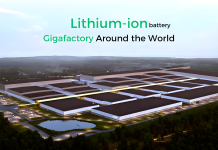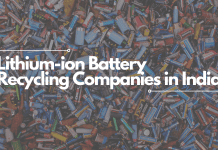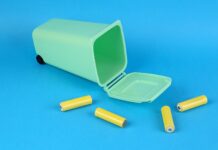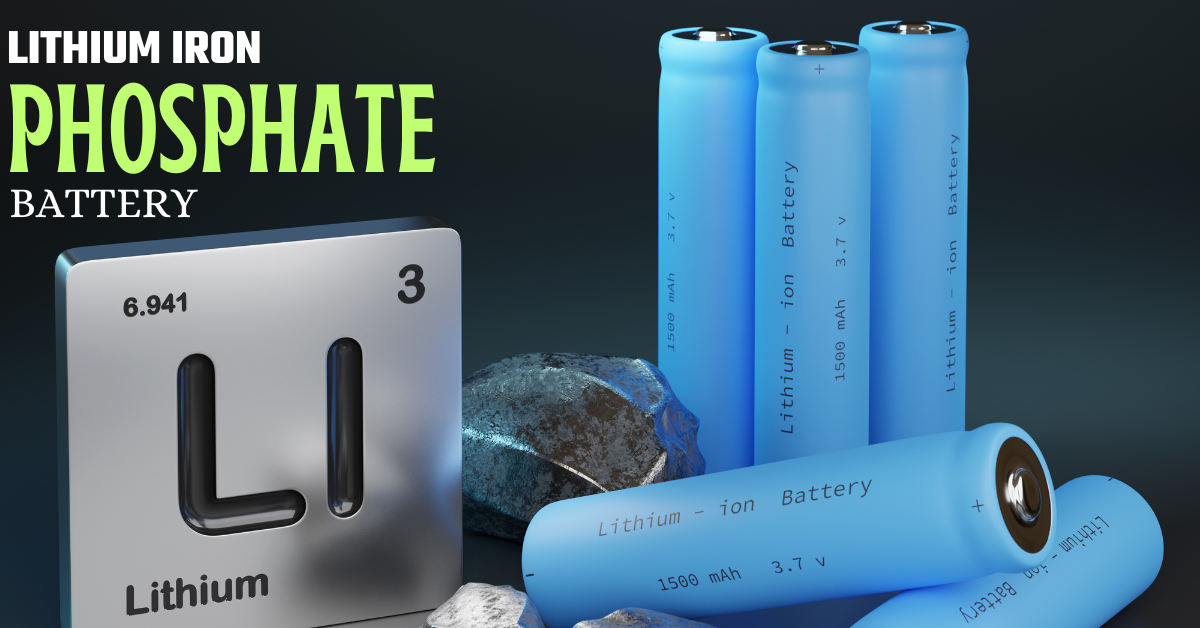
Table of Contents
Lithium Iron Phosphate Battery
Lithium Iron Phosphate (LiFePO4 or LFP) batteries are a type of rechargeable lithium-ion battery known for their high energy density, long cycle life, and enhanced safety characteristics. Lithium Iron Phosphate (LiFePO4) batteries are a promising technology with a robust chemical structure, resulting in high safety standards and long cycle life. Their cathodes and anodes work in harmony to facilitate the movement of lithium ions and electrons, allowing for efficient charge and discharge cycles. These batteries have found applications in electric vehicles, renewable energy storage, portable electronics, and more, thanks to their unique combination of performance and safety.
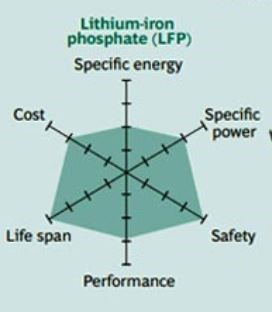
Chemical Formula
The chemical formula for a Lithium Iron Phosphate battery is:
LiFePO4.
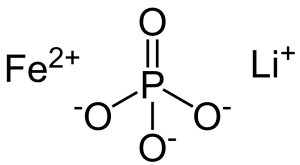
The specific arrangement and chemical reactions within the battery involve multiple phases and materials, but the fundamental chemistry revolves around these components.
Working of Lithium Iron Phosphate Battery:
Electrochemical Reactions
LiFePO4 batteries operate on the principles of electrochemistry, involving the movement of lithium Irons between the cathode and anode during charge and discharge cycles.
Charging (Discharge):
- At the anode (negative electrode), during charging, lithium Irons are extracted from the cathode material (LiFePO4) and intercalated into the anode material, typically graphite. This reaction can be represented as: LiFePO4 ⟶ LiFePO4-x + xLi^+ + xe^-
- The electrons released during this process flow through an external circuit, producing electrical energy that can be used to power various devices.
- At the cathode (positive electrode), the lithium Irons migrate through the electrolyte and separator, reaching the anode. Here, they are intercalated into the anode material (graphite), stored as Li_xC6, releasing energy in the form of electrical potential.
Discharging (Charge):
- During discharging, the stored energy is released as lithium Irons migrate from the anode to the cathode, allowing for the flow of electrons through the external circuit, thereby powering devices.
- At the cathode, LiFePO4 accepts lithium Irons and electrons to form LiFePO4-x. This process stores energy in the cathode material.
- The overall reaction is reversible, enabling multiple charge and discharge cycles.
Selection of Cathode and Anode for Lithium Iron Phosphate Batteries:
Cathode (Positive Electrode):
- The cathode in a LiFePO4 battery is typically made of lithium iron phosphate (LiFePO4). This material has several advantages, including:
- High thermal and chemical stability, contributing to the battery’s safety.
- Low cost and environmental friendliness due to the absence of toxic or rare materials.
- Good cycle life, allowing for a high number of charge and discharge cycles.
- Stable voltage profile, making it suitable for applications requiring constant voltage.
Anode (Negative Electrode):
- The anode in LiFePO4 batteries is commonly made of graphite. Graphite provides a stable and reversible platform for the intercalation of lithium Irons during charging and discharging.
- High electrical conductivity, facilitating efficient electron transfer.
- Excellent lithium-ion intercalation properties.
- Stability over numerous charge and discharge cycles.
Some Advantages of Lithium Iron Battery:
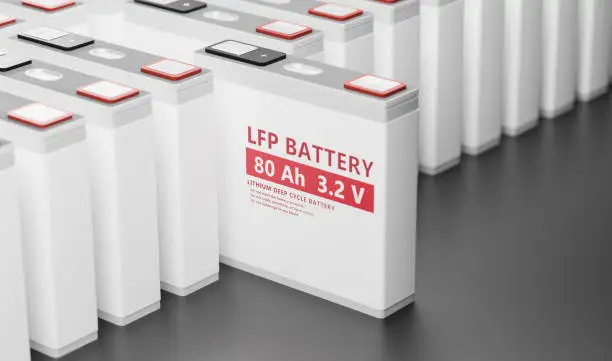
- Safety: LiFePO4 batteries have a lower risk of thermal runaway and are less prone to overheating, making them safer for various applications, including electric vehicles.
- Long Cycle Life: LiFePO4 batteries can endure a significantly higher number of charge and discharge cycles, often exceeding 2000 cycles, before showing significant capacity degradation.
- High Energy Density: While not as high as some other lithium-ion chemistries, LiFePO4 batteries offer a good balance between energy density and safety.
- Environmental Friendliness: LiFePO4 batteries contain non-toxic materials, making them more environmentally friendly and easier to recycle.
Top 10 Manufacturers of Lithium Iron Phosphate Batteries
1. BYD Corporation
Chinese multinational BYD Corporation focuses on producing electric cars, battery energy storage systems, and other green energy-related goods.
2. A123 Systems
Its headquarters are located in Livonia, Michigan, in the United States.A123 Systems is a well-known company that specializes in designing and manufacturing advanced lithium-ion batteries and energy storage systems. They have been prominent in the development and application of lithium iron phosphate (LiFePO4) battery technology.
3. K2 Energy
Its headquarters is in Henderson, Nevada, in the United States. K2 Energy is a company that specializes in advanced lithium iron phosphate (LiFePO4) battery technology and energy storage solutions. They are known for developing and manufacturing LiFePO4 batteries for a wide range of applications.
4. OptimumNano Energy Co. Ltd
Its headquarters is in Shenzhen, China. OptimumNano Energy Co. Ltd. is a Chinese company specializing in lithium-ion phosphate (LiFePO4) battery technology and related products.
5. LiFeBATT
LiFeBATT is one the largest lithium iron phosphate battery manufacturers around the globe. Danville, Virginia, USA serves as the company’s current headquarters. They were known for designing and manufacturing LiFePO4 batteries and battery systems for various applications like Energy Storage, Marine and RV Applications, Industrial and Commercial Applications, and Custom Battery Solutions.
6. LITHIUMWERKS
A Dutch-American business called LITHIUMWERKS. Its main office is in Austin, Texas, in the United States. Specializes in the design and production of cutting-edge lithium-ion batteries and energy storage devices.
7. CENS Energy Tech
It has its headquarters in Taipei, Taiwan. Manufacturing lithium iron phosphate (LiFePO4) batteries are a specialty of CENS Energy Tech. Rechargeable batteries known as LiFePO4 use a lithium-ion electrolyte and an iron phosphate cathode as their anodes. They are renowned for their safety, extended cycle life, and great energy density.
8. RELiON Batteries
Its US headquarters are in Monroe, Connecticut. RELiON Batteries is a well-known company that specializes in lithium iron phosphate (LiFePO4) batteries and energy storage solutions. They are recognized for producing high-performance, reliable, and safe LiFePO4 batteries for a wide range of applications.
9. Bharat Power Solutions
Bharat Power Solutions is one of the prominent lithium iron phosphate battery manufacturers across the globe. The company’s current headquarters resides in Delhi. Their prime products are Lithium-ion batteries, Lithium Iron Phosphate Batteries, and Lithium polymer Batteries. They are the leading Manufacturer, wholesaler, and exporter in India.
10. CATL
Contemporary Amperex Technology Co. Limited is one of the world’s largest and most prominent manufacturers of lithium-ion batteries. CATL is known for its significant presence in the battery industry, particularly in the production of lithium-ion batteries for various applications, including electric vehicles (EVs) and energy storage. CATL is a major supplier of lithium-ion batteries for electric vehicles. They provide a range of battery products tailored to different types of EVs, including passenger cars, buses, trucks, and more. CATL’s batteries are used by many leading automakers worldwide.
Read More:- Types of Batteries Used in Electric Vehicles in India

